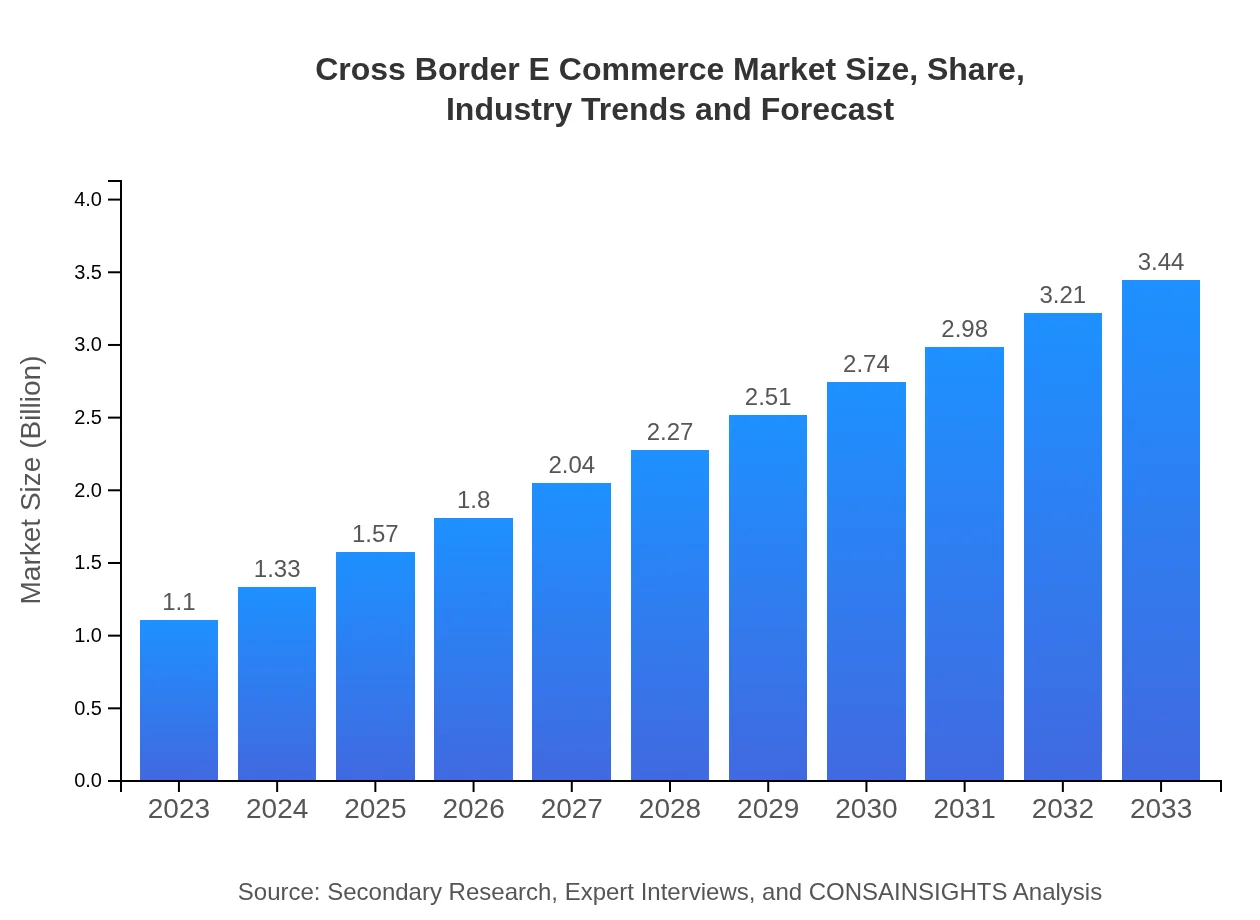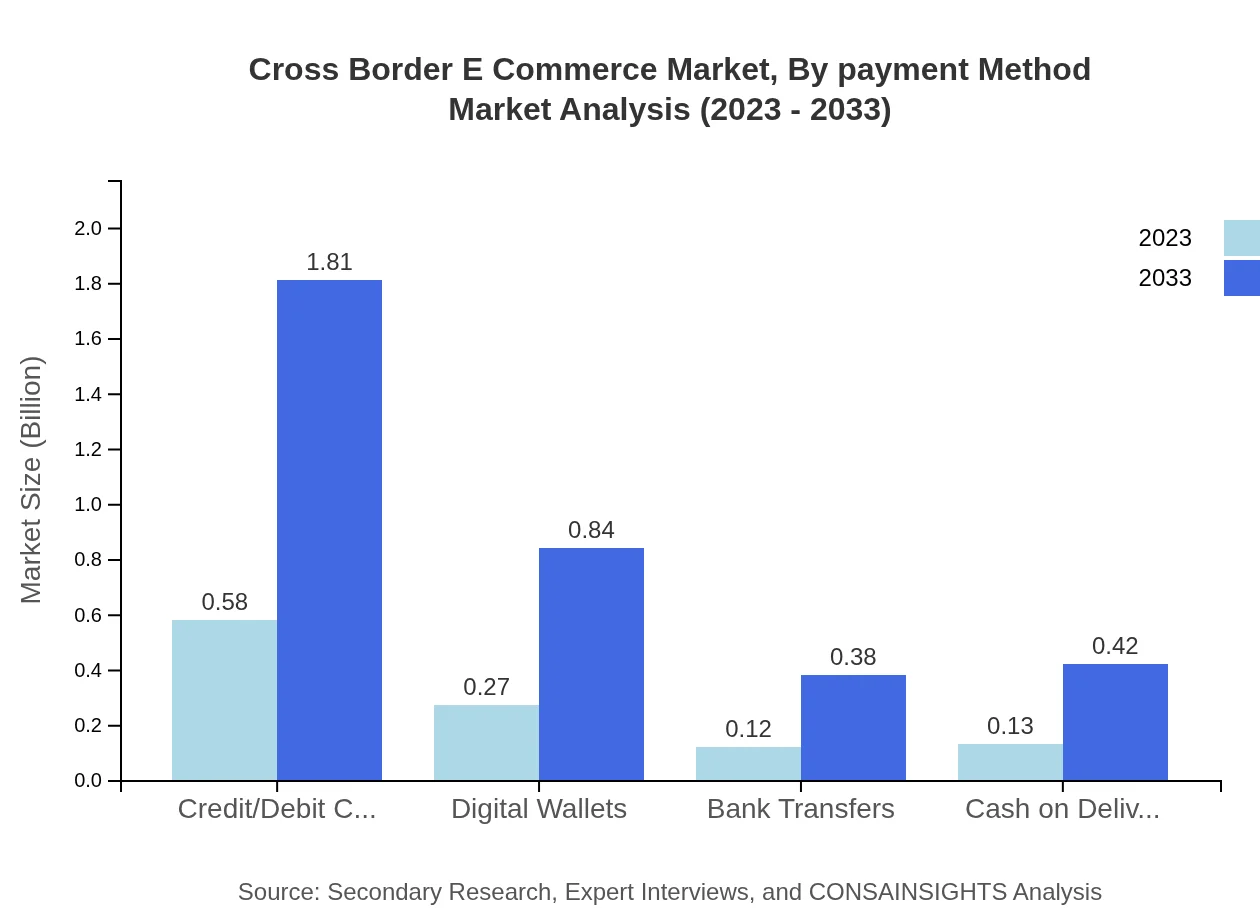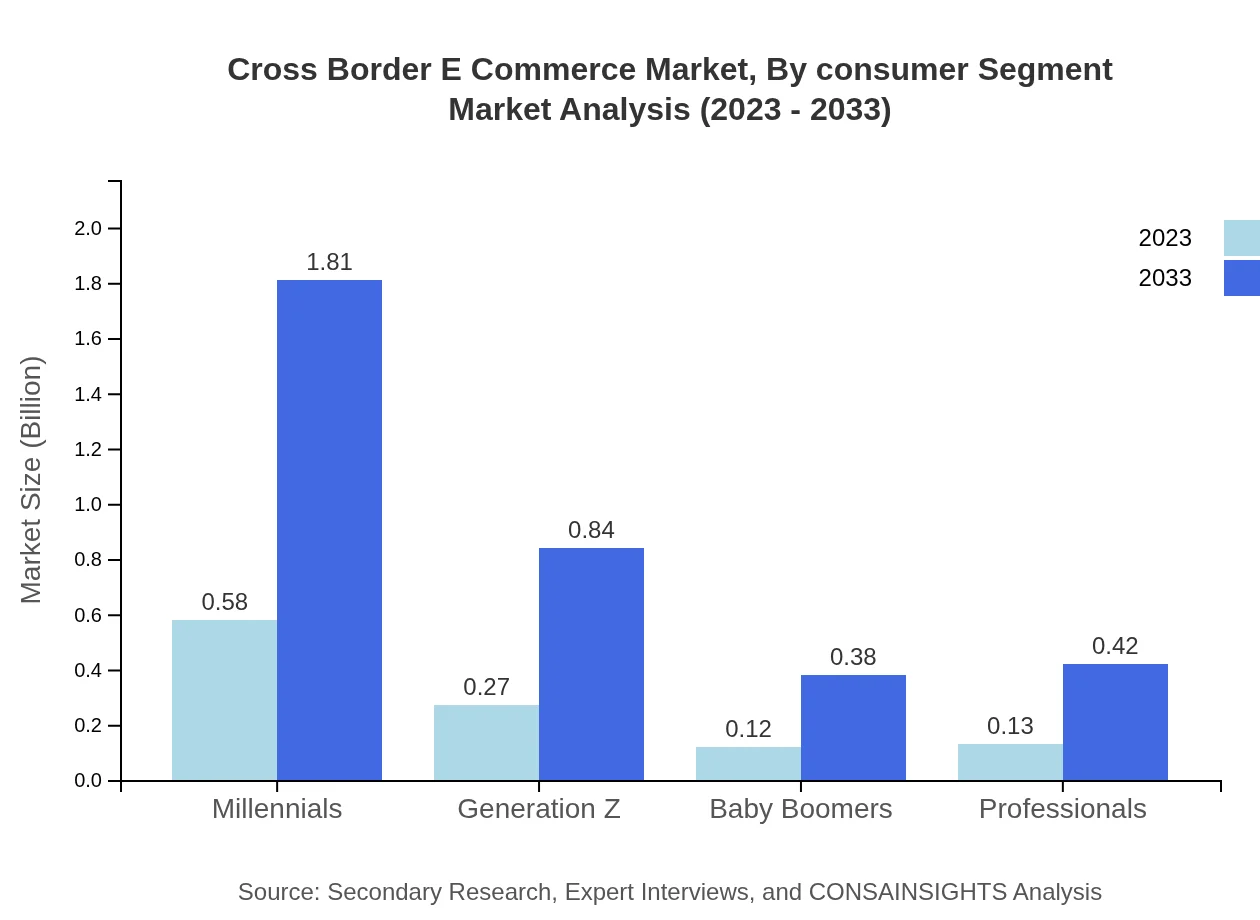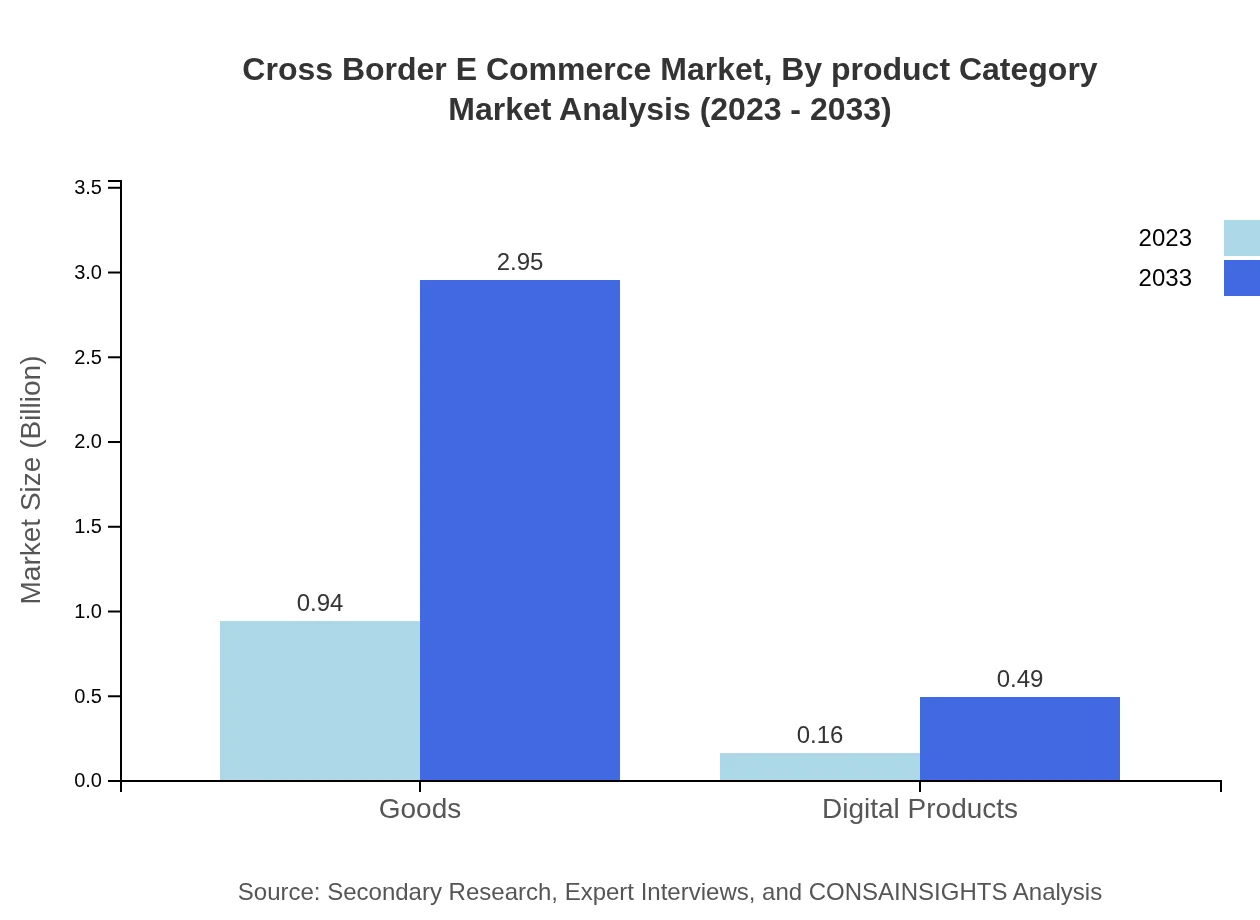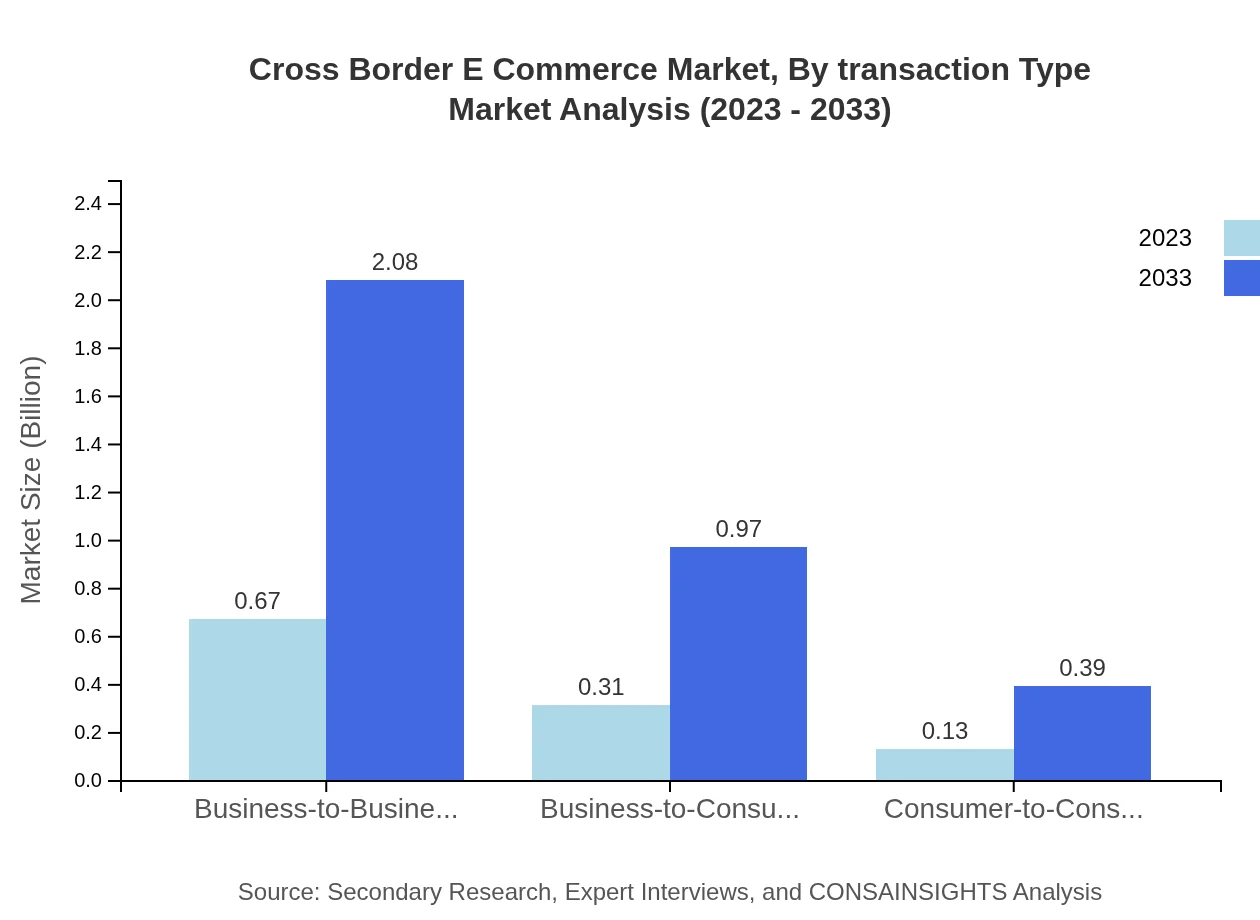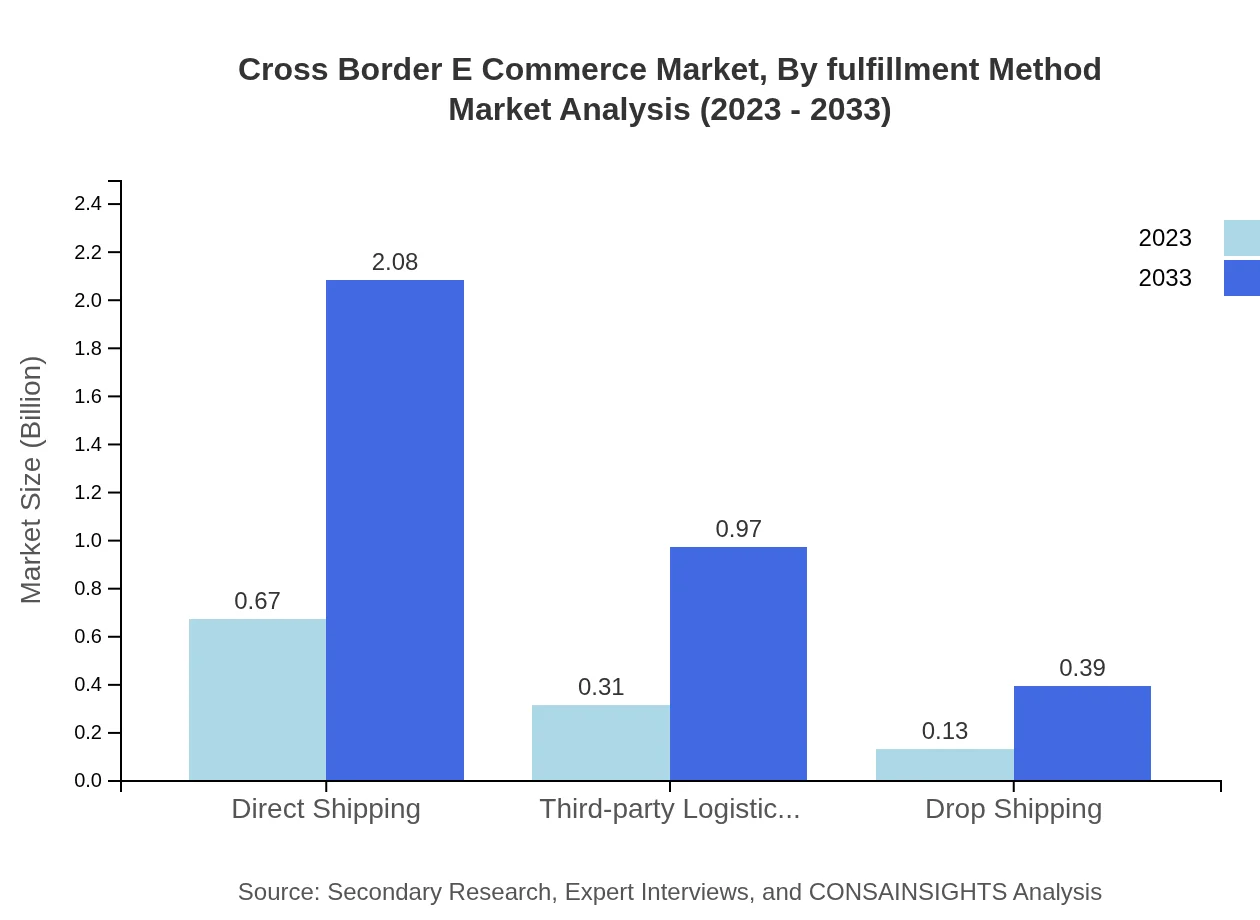Cross Border E Commerce Market Report
Published Date: 31 January 2026 | Report Code: cross-border-e-commerce
Cross Border E Commerce Market Size, Share, Industry Trends and Forecast to 2033
This report provides a comprehensive analysis of the Cross Border E Commerce market, detailing market conditions, size forecasts from 2023 to 2033, segmentation insights, and future trends impacting the industry.
| Metric | Value |
|---|---|
| Study Period | 2023 - 2033 |
| 2023 Market Size | $1.10 Trillion |
| CAGR (2023-2033) | 11.6% |
| 2033 Market Size | $3.44 Trillion |
| Top Companies | Alibaba Group, Amazon , eBay, Shopify |
| Last Modified Date | 31 January 2026 |
Cross Border E Commerce Market Overview
Customize Cross Border E Commerce Market Report market research report
- ✔ Get in-depth analysis of Cross Border E Commerce market size, growth, and forecasts.
- ✔ Understand Cross Border E Commerce's regional dynamics and industry-specific trends.
- ✔ Identify potential applications, end-user demand, and growth segments in Cross Border E Commerce
What is the Market Size & CAGR of Cross Border E Commerce market in 2023?
Cross Border E Commerce Industry Analysis
Cross Border E Commerce Market Segmentation and Scope
Tell us your focus area and get a customized research report.
Cross Border E Commerce Market Analysis Report by Region
Europe Cross Border E Commerce Market Report:
Europe's market is expected to surge from $0.34 billion in 2023 to $1.08 billion by 2033, thanks to the robust retail ecommerce framework and an increasing preference for buying foreign goods.Asia Pacific Cross Border E Commerce Market Report:
In 2023, the Cross Border E Commerce market in the Asia Pacific region is valued at $0.20 billion, with projections to reach $0.64 billion by 2033. This growth is primarily driven by China's rapid digital transformation and the rising middle-class consumers eager to shop internationally.North America Cross Border E Commerce Market Report:
North America's Cross Border E Commerce market is anticipated to grow from $0.39 billion in 2023 to $1.22 billion by 2033. Strong logistical infrastructure and consumer demand for international products are key drivers fueling this growth.South America Cross Border E Commerce Market Report:
The South American market is projected to grow from $0.06 billion in 2023 to $0.18 billion by 2033. Factors contributing to this growth include increased internet penetration and a growing familiarity with online shopping, especially among younger consumers.Middle East & Africa Cross Border E Commerce Market Report:
In the Middle East and Africa, the market is set to increase from $0.10 billion in 2023 to $0.32 billion by 2033, driven by a young population and increasing GDP growth in various countries encouraging cross-border shopping.Tell us your focus area and get a customized research report.
Cross Border E Commerce Market Analysis By Payment Method
Credit/Debit Cards dominate the payment landscape in Cross-Border E-Commerce, accounting for 52.45% share in 2023 and expected to remain stable at the same market share in 2033, totaling $0.58 billion rising to $1.81 billion. Digital Wallets follow with significant traction, holding a 24.26% share, growing from $0.27 billion to $0.84 billion. Bank Transfers and Cash on Delivery make up 11.03% and 12.26% shares respectively, illustrating diverse consumer preferences.
Cross Border E Commerce Market Analysis By Consumer Segment
Millennials and Generation Z represent the largest consumer segments within Cross-Border E-Commerce, maintaining a market size of $0.58 billion and $0.27 billion in 2023, expected to rise to $1.81 billion and $0.84 billion by 2033. Meanwhile, Baby Boomers and Professionals account for smaller shares, indicative of shifting generational behaviors towards online shopping.
Cross Border E Commerce Market Analysis By Product Category
Goods lead the product category, dominating with an 85.63% market share in 2023 valued at $0.94 billion, forecasted to increase to $2.95 billion by 2033. Digital Products hold a 14.37% share, indicating the growing value of virtual goods in consumer preferences as they grow from $0.16 billion to $0.49 billion.
Cross Border E Commerce Market Analysis By Transaction Type
Business-to-Business (B2B) transactions occupy a substantial share, starting at 60.51% in 2023 with growth expected to reinforce its status in the years to come, as it increases from $0.67 billion to $2.08 billion. Business-to-Consumer (B2C) and Consumer-to-Consumer (C2C) also play pivotal roles, highlighting the varied modalities of Cross Border transactions.
Cross Border E Commerce Market Analysis By Fulfillment Method
Direct Shipping currently holds 60.51% market share with forecasted revenues growing from $0.67 billion to $2.08 billion by 2033, leading the fulfillment method analysis. Third-party Logistics (3PL) and Drop Shipping play essential roles as well, complementing the logistics framework of cross-border transactions.
Cross Border E Commerce Market Trends and Future Forecast
Tell us your focus area and get a customized research report.
Global Market Leaders and Top Companies in Cross Border E Commerce Industry
Alibaba Group:
A global leader in e-commerce, Alibaba offers a comprehensive platform for businesses to sell products internationally while providing extensive logistics solutions.Amazon :
Amazon facilitates cross-border trade with its extensive warehousing and delivery network, providing international sellers access to its vast customer base.eBay:
eBay allows individuals and businesses to trade goods across borders, creating a thriving online marketplace with global reach.Shopify:
Shopify provides tools for businesses to set up cross-border online stores, significantly enhancing the ease of global e-commerce transactions.We're grateful to work with incredible clients.









FAQs
What is the market size of cross Border E Commerce?
The cross-border e-commerce market is set to reach $1.1 trillion by 2033, growing at a CAGR of 11.6%. This growth reflects the increasing globalization of retail and consumer demand for international goods.
What are the key market players or companies in the cross Border e Commerce industry?
Key players include Alibaba, Amazon, eBay, and Shopify. These companies lead the market by providing innovative platforms and comprehensive logistics solutions to enhance global shopping experiences.
What are the primary factors driving the growth in the cross Border e Commerce industry?
The growth is driven by increased internet penetration, growing consumer demand for international products, enhanced payment solutions, and logistics advancements that improve the efficiency of cross-border deliveries.
Which region is the fastest Growing in the cross Border e Commerce?
The fastest-growing region is North America, projected to grow from $0.39 trillion in 2023 to $1.22 trillion by 2033, showcasing strong e-commerce integration and consumer willingness to shop internationally.
Does ConsaInsights provide customized market report data for the cross Border e Commerce industry?
Yes, ConsaInsights offers customized market report data tailored to specific needs within the cross-border e-commerce sector, ensuring clients receive relevant information for their business strategies.
What deliverables can I expect from this cross Border e Commerce market research project?
Clients can expect comprehensive reports including market size analysis, growth forecasts, competitive landscape assessments, consumer insights, and regional market breakdowns, enabling informed decision-making.
What are the market trends of cross Border e Commerce?
Trends include a shift towards mobile commerce, increasing use of digital wallets, a greater focus on sustainability, and the rise of social media platforms influencing purchasing decisions globally.

